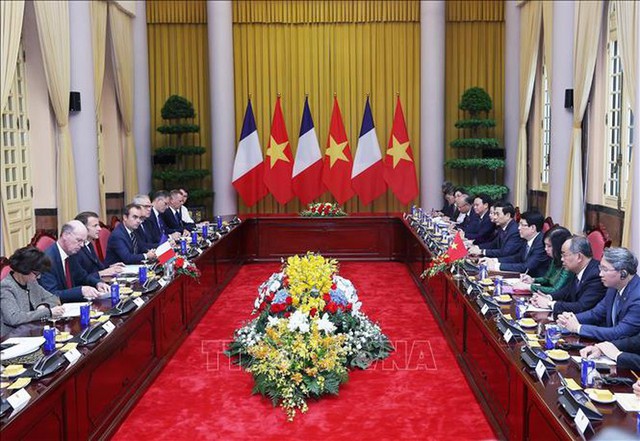Vietnamese, French Presidents hold talks in Ha Noi
VGP - President Luong Cuong held talks with his French counterpart Emmanuel Macron in Ha Noi on May 26.

President Luong Cuong holds talks with his French counterpart Emmanuel Macron, Ha Noi, May 26, 2025 - Photo: VNA
Macron is on a State visit to Viet Nam from May 25-27. This is the first visit to Viet Nam by a French President over the recent decade and also the first high-level delegation exchange between the two countries since their relationship was upgraded into a Comprehensive Strategic Partnership in October 2024.
Luong warmly welcomed President Macron's visit, emphasizing that it is a clear testament to the two countries' determination to advance the Comprehensive Strategic Partnership in a substantive and effective manner.
France holds an important position in Viet Nam's foreign policy and is the first EU country with which Viet Nam has established a Comprehensive Strategic Partnership-the highest level in Viet Nam's diplomatic hierarchy, noted Luong.
Viet Nam always treasures the multifaceted cooperation with France and advocates France's active role in international organizations such as the United Nations, the Francophonie, and UNESCO, he added.
He suggested the two countries continue to leverage their shared advantages to jointly address global challenges and harmoniously resolve emerging regional and international issues.
The host took the occasion to invite the senior French leaders to attend the signing ceremony of the United Nations Convention against Cybercrime, which will be held in Ha Noi in October this year.
He called on France to expedite the ratification of the EU–Viet Nam Investment Protection Agreement and urge the European Commission to soon lift the IUU "yellow card" against Vietnamese seafood exports to France and the EU.
Macron, for his part, thanked the Party, State, and people of Viet Nam for their warm welcome, expressing his admiration for Viet Nam's rapid and robust development and its remarkable socio-economic achievements in recent years.
France expects to continue strengthening cooperation with Viet Nam in traditional areas, particularly healthcare, education, and culture, while also expanding collaboration into new fields such as infrastructure, urban transportation, aerospace, renewable energy, and shared historical memory, said Macron.
Both leaders vowed to increase delegation exchanges and contacts at all levels, especially high-level ones across all channels and effectively implement the existing cooperation mechanisms while exploring the establishment of new ones and maintaining close coordination at international and regional forums.
They underlined the need to implement the defense and security cooperation agreements, including those related to transnational crime combat.
The two leaders pledged to promote trade and investment, and effectively implement and leverage the EU–Viet Nam Free Trade Agreement.
They stressed the necessity of foster cooperation in science and technology, innovation, artificial intelligence, semiconductor, and digital transformation, particularly cooperation in training high-quality human resources.
The leaders also committed to expanding scientific research collaboration, advancing technology transfer, and investing in the development of digital infrastructure.
The two leaders agreed to continue strengthening and promoting cooperation in traditional areas such as education and training, healthcare, and justice, as well as culture and tourism, agriculture, and climate change response.
Viet Nam suggested that France continue its support for development cooperation through official development assistance (ODA) and concessional government loans for projects aimed at enhancing climate resilience and improving the quality of human resources in energy sector.
The French side committed to continuing its support for Viet Nam in implementing specific projects within the framework of the Just Energy Transition Partnership (JETP).
The Vietnamese President reaffirmed that Viet Nam remains steadfast to its "Four Nos" defense policy in international relations.
Both sides emphasized the vital role of multilateralism, with the United Nations at its core.
President Macron voiced his support for ASEAN's principled stance on the East Sea.
Both sides stated that the 1982 United Nations Convention on the Law of the Sea (UNCLOS 1982) is the comprehensive legal framework governing all activities and cooperation at sea and in the oceans.
They reaffirmed their commitment to maintaining peace, stability, security, safety, and freedom of navigation and overflight in the region, resolving disputes by peaceful means based on international law, and supporting all efforts to promptly achieve an effective and substantive Code of Conduct in the East Sea (COC) that complies with international law, especially UNCLOS 1982./.

